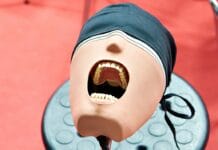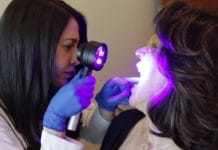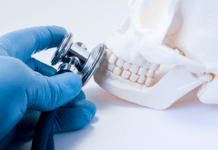If I were to ask you to think back to dental hygiene school, some would remember the feelings of being overwhelmed, being stressed to the max, and the tears that were shed. Others might remember the friends they made and the happiness they felt when hard work turned into successfully earning that dental hygiene degree. When I think back, it’s a combination of all of those things.
For the students just entering the program or those who are several terms in, eyeballs-deep in osseous defects, periodontology, and research papers, I’d like to share a few words of encouragement.
Looking back, these are some things I wished I could have told myself during my time in Dental Hygiene School.
Being completely real here, the dental hygiene program is no walk in the park; it’s vigorous. During my first week of the program, I think I spent more time staring at my books and the assignments that were due, than actually sitting down and completing them. I simply didn’t know where to start, and I was overwhelmed. I’ll be the first to admit that I’m a perfectionist and when something needs to be done, I want it done yesterday. Needless to say, I had to learn the virtue of patience very quickly.
I’ve always been an overly-organized person, but the first week is when I had to put this skill into overdrive. Each week I made an assignment sheet, showing what was due soon and what was coming up due, including both homework and exams. I, then, prioritized them. Procrastination simply wasn’t an option. That’s my first slice of advice – get yourself organized and then don’t procrastinate.
Before entering the dental hygiene program, I thought I was a pretty tough cookie emotional-wise. I could handle quite a bit when the tough got tougher. At about three weeks in, however, there I was, in the student lounge crying my eyes out. And I’m not a pretty crier.
I was questioning if I made the right choice by pursuing my dream of becoming a hygienist and even worse, questioning my abilities. I didn’t think I could make it through the program and was on the verge of quitting. I just wanted to go home (I went to college across the state). Thank teeth for some upper classmates and truly invested instructors, I was talked off the ledge I had put myself on.
My instructors reminded me of why I was chosen for the program, of my fascination of dentistry, and how I wanted to be the “Patch Adams” of hygienists. (If you haven’t seen that Robin Williams movie, you should!). The students in the class above me assured me that feeling overwhelmed is normal; they went through it too.
I dried those tears and trotted myself right back to class because it’s true, we all were going through the same thing, and so did others before us. If they can do it, so can I.
This brings me to my second piece of advice. Every hygienist who has earned their dental hygiene degree made it through the program with effort and hard work. So can you! As the weeks and months begin to fly by, you will find your routine, and things will get easier. Find a mentor or someone you can confide in, whether this is a classmate, someone from the upper class, or even an instructor. Ask questions and take their advice. Don’t hesitate to ask for tips or tricks because they might have some ideas that you haven’t thought of to make hygiene school easier.
As I began finding my routine and got into the swing of hygiene school, I started questioning why my instructors were making us do the things they did. I mean, how many times am I going to have to write a paper on a piece of research and tear it apart finding the validity of the study? Why do I have to fill out seven pages about gingival description, AAP Classification, ASA Classification, occlusion, etc. on every single patient I see in clinic? Why, oh why, do we have all of the clinical competencies and requirements each term? Why all the rules – no cussing, no painted nails, hair back, no pink highlighted hair, light makeup, no dog hair-covered or wrinkled scrubs, etc.? And for the love of teeth, why can’t I just get a straight answer from an instructor when I have a question, but instead am told to go find my own answer?
I’m paying a pretty penny to learn here, JUST GIVE ME THE ANSWER!
I didn’t get it at the time, but now looking back, I completely understand why my instructors had the students do each and everything they made us do. All of this was in preparation to be the very best hygienist I could be. To this day, I need to read research and gauge its validity.
When I see patients in practice, I don’t even think twice about describing their gingiva or a suspicious lesion. Radiographs, sealants, injections, polishing and other clinical competencies are now second nature when I treat patients. No cussing, hair back, no pink highlighted hair, short nails and all of the rules we were expected to abide by, some were not only to teach infection control but were to teach you professionalism.
Whether we like it or not, our patient’s judge. The doctors that hire you judge. You are a licensed professional, and you should look and act as such. My instructors put it the best – You aren’t just representing yourself anymore. You are representing this school and dental hygienists as a whole. Hygienists already fight to be seen as medical professionals, so represent yourself well, because the industry depends on it. This was a profound statement to me, and I still find it to be true today.
The biggest frustration of all, not getting a straight answer, was to teach critical thinking. No one can know everything, but everyone is capable of using their critical thinking skills and finding an answer for themselves. Critical thinking isn’t only a must-have skill for being a hygienist but is an extremely important life skill. One that I am glad I learned, no matter how frustrating it was at the time.
Another tip that knowing right off the bat that would have been super helpful is not to cram and just memorize information before tests. It is so very important to take the time to study and learn the information. This not only makes studying for and taking board exams much easier, but it makes the knowledge stick with you throughout your career. When a patient asks, “What caused my perio disease?” You aren’t at a loss for words because you actually know the microbiology and etiology so you can explain it in a manner they understand. It is so much easier to explain something to a patient when you have a true understanding.
I also wished I could tell myself not to compare myself to other classmates. Learning, then excelling, is not a race. Just because “Nicole” always has open contacts on bitewings she takes, right off the bat, doesn’t mean that you won’t be able to in time, with practice. Some people pick things up faster than others but know that they have their strengths, just as you have your own.
Just because you struggle with getting the perfect radiograph with all the teeth in the shot and perfect, open contacts, doesn’t mean “Nicole” doesn’t struggle with using the Gracey 13/14. Just like our patients are individuals and should be treated as such, you are an individual too. Practice and put in the effort, but don’t get down on yourself because someone else seems to do something better than you. Instead, use that as a goal and strive to excel on your own terms.
Confidence: Learn it, work toward it, and tend to it.
Be confident and aware of your strengths. Also, be aware of your downfalls and skills you need to work on. Knowing what you need work on, will give you focus. You might surprise yourself when a downfall becomes a strength.
Lastly, don’t hesitate in asking for help. If you just can’t seem to adapt an instrument and remove calculus from the mesial of tooth 14, grab an instructor and work with them on your technique. Your instructors became educators because they have a true passion for shaping bright, new hygienists. Pick their brains because they are full of awesome experience and knowledge.
Further, don’t become frustrated when an instructor corrects you. Learning how to take constructive criticism will allow you to excel. This was especially tough for me to learn, but when I did, everything changed for me in hygiene school.
The hygiene program isn’t easy. It’s like that for a reason. While I couldn’t see it during school, looking back, I’m extremely thankful for everything my instructors and the program put me through. It’s true that you get out of it what you put in. I highly encourage you to make the extra effort, really apply yourself, and enjoy your time! You got this!
Before you leave, check out the Today’s RDH self-study CE courses. All courses are peer-reviewed and non-sponsored to focus solely on high-quality education. Click here now.












